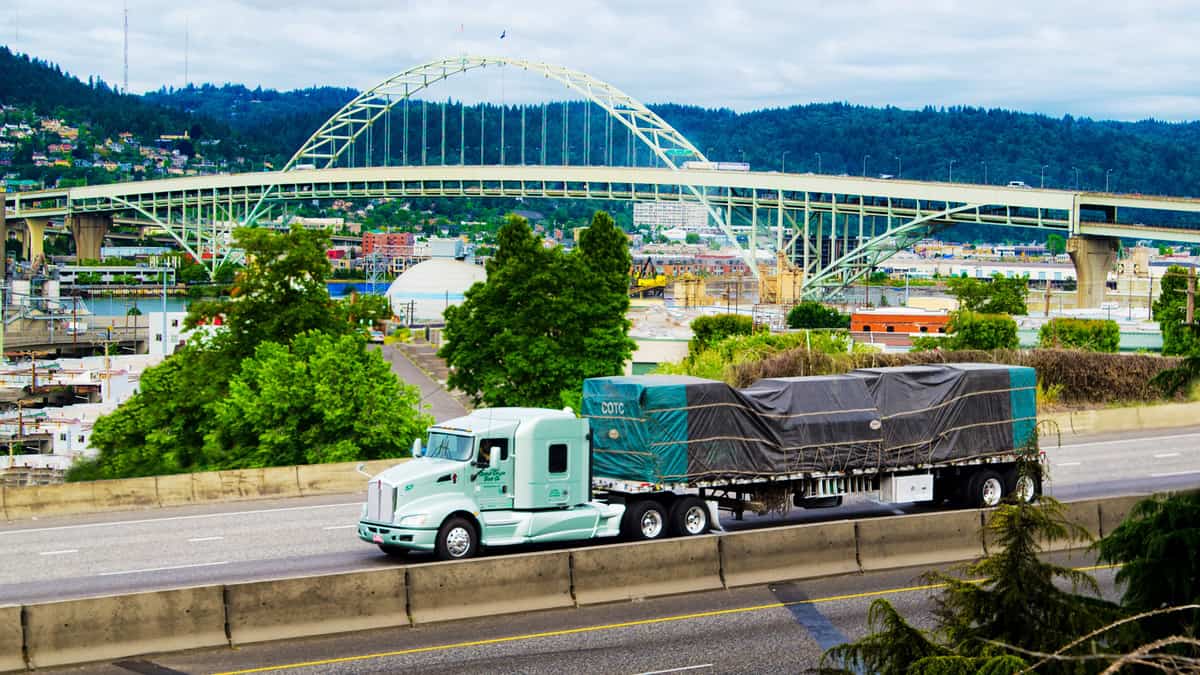A new cap-and-trade carbon emissions bill unveiled in Oregon last week continues to draw criticism from the trucking industry that helped derail similar legislation last year.
“If you look at the latest version for the upcoming session, it’s not much different than [last year’s] House Bill 2020,” said Jana Jarvis, head of the Oregon Trucking Associations. “Cap and trade does nothing to reduce carbon; all it does is increase costs.”
The new proposal, currently known as Legislative Concept 19, includes many features from last year’s version, which failed to pass after a high-profile walkout by Republican senators.
The bill would rein in carbon emissions by capping overall emissions allowed in the state, forcing large polluters to either reduce emissions or purchase credits for each ton of gas they emit. That cap would lower over time, so the state’s overall emissions would also decline.
To placate industries and rural communities that opposed the original legislation, Concept 19 includes several new provisions easing pollution targets.
A concession to the transportation sector, for example, would phase in the fuel emissions cap based on geography.
Portland metro area fuels would be regulated first, beginning in 2022, with most other metro areas following suit in 2025. What is more, 19 counties in the rest of the state could opt out of the program altogether, thus avoiding the higher fuel costs many auto-dependent rural communities objected to when cap-and-trade was debated last year.
The intended beneficiaries of that plan were not overly enthusiastic.
In testimony delivered last week during the bill’s first public hearing, Mark Gram, the COO of Jubitz Corp., a company that operates fleet fueling services, as well as a large Travel Center in Portland, said regulating fuel sales based on location would be a complicated task. That’s because importers, not the fuel seller, are going to be the “obligated party,” he said.
“We deliver fuel inside and outside of impacted areas,” Gram testified, “so I don’t know how the state’s going to give an exemption based on any data the importer would have.”
Gram also raised concerns about truck drivers bypassing truck stops on the Oregon side for cheaper fuel in Washington state, which has no cap-and-trade program.
“We have significant questions and concerns about how it will be implemented,” he said.
The trucking industry has already been working to reduce emissions through technology improvements as well as fuel-blending requirements imposed by Oregon’s low carbon fuel standard, according to Jarvis. That law, enacted in 2015, requires oil companies to reduce carbon pollution from their gasoline by 10% over 10 years.
“Heavy-duty trucks don’t have a [clean] technology option available today,” Jarvis said. There’s a lot of talk about hydrogen fuel cell vehicles, she said, “and that’s great,” but those technologies “are 10 or 20 years away,” whereas the cost mandates in the Oregon legislation would take effect in the next couple of years.
Oregon’s new bill, which will undergo modifications once the legislative session starts Feb. 3, comes as other states are trying, with varying degrees of success, to enact legislation that would limit carbon emissions that contribute to global warming.
An attempt to levy a carbon tax on fossil-fuel polluters in Washington state failed last year.
Separately, the Washington State Supreme Court last week moved to limit a state rule aimed at capping the state’s greenhouse gas emissions, raising the question of whether Washington will be able to cap transportation fuel emissions.
Transportation is the biggest single source of greenhouse gas emissions in Washington and the rest of the country.
California already has a cap-and-trade program, and Vancouver, British Columbia, implemented a carbon tax in 2008.
Oregon governor Kate Brown has said passing the cap-and-trade legislation is a top priority this year. Setting the stage for another fight, Jarvis, along with many Republican legislators, supports referring the cap-and-trade bill to voters in the form of a ballot measure. “If Oregonians really want this bill, it needs to go to them,” she said.












Mike
Time for states to adopt their own electoral college, to vote these lunatics out.
Tax Slave
Oregon Gov. Kate Brown and the speaker of the House of Representatives, both Democrats, said Friday that passing legislation aimed at stemming global warming is their priority when lawmakers return to the Capitol next month. This is top Priority , Really ?
What about the state debt problem, what about ” Job’s ” which is what this will kill. What about the homeless problem in downtown Portland, no none of that is a priority, what is the real priority, Raise Tax’s, create new one’s. That is the real Priority.